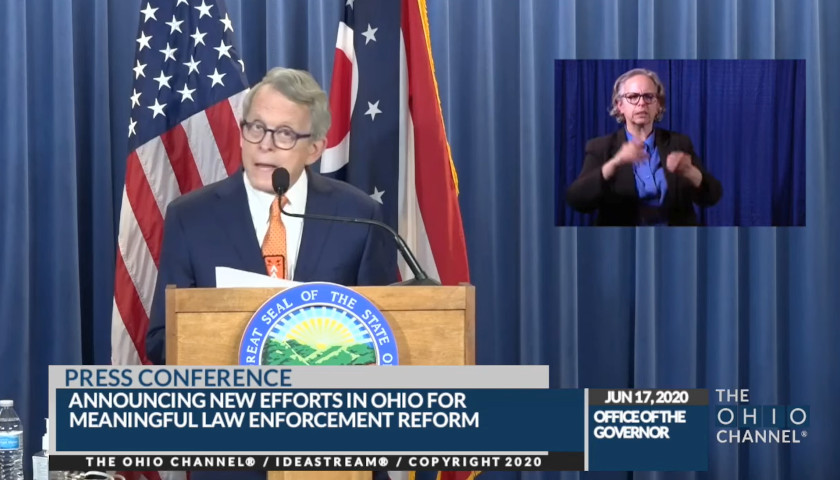COLUMBUS, Ohio (AP) — All shootings by Ohio police officers and any deaths of individuals in custody would be investigated by independent agencies under a proposal announced Wednesday by Republican Gov. Mike DeWine in his first major response to days of protests over police treatment of minorities.
As part of the proposal, the State Highway Patrol, which is under DeWine’s direct supervision, will no longer investigate its own shootings, the governor said.
DeWine also wants lawmakers to create a law enforcement oversight and accountability board similar to licensing boards for professionals like doctors and lawyers, with the authority to revoke an officer’s ability to work as an officer in the state if necessary.
The governor also called on lawmakers to ban police choke holds except in life-and-death cases. He ordered the state patrol and the state Bureau of Criminal Investigation to outfit all officers with body cameras, and asked lawmakers to find ways to pay for more body cameras for officers statewide.
DeWine requested that the Republican-controlled Legislature, which has recessed for the summer, to take up the measures immediately. Nothing he’s proposing is new, and much of it has been discussed previously, the governor said.
“These are things that have been around for a long time, and it’s time for us to take action,” DeWine said.
Under a bill introduced June 11 by House Republicans, Ohio would create a statewide disciplinary database for violent officers and require psychological testing for all new police officers.
That bill “is the beginning of what we expect will be a robust and thoughtful conversation,” sponsors Rep. Phil Plummer and Rep. Cindy Harris said Wednesday in response to DeWine’s proposals.
Senate Republicans encouraged Ohioans to participate in upcoming legislative hearings on police proposals. Spokesman John Fortney said it was too early to say whether those hearings would happen this summer.
Rep. Emilia Sykes of Akron, the top Democrat in the House, criticized DeWine for briefing members of the Ohio Legislative Black Caucus at the last minute—earlier Wednesday—before announcing his plan.
She said reforms must go beyond policing, and pushed for support for a pending resolution that declares racism a public health crisis in Ohio.
“Statehouse Republicans, from the governor to the speaker, don’t seem interested in truly listening to Black Ohioans,” Sykes said in a statement. “They think they have the answers to hundreds of years of racism, brutality and oppression. They do not.”
Thousands of people have protested racism and police brutality in multiple Ohio communities since the death of George Floyd in Minneapolis last month.
Also Wednesday, DeWine:
— Announced the state will pay for six additional hours of police training this year on how to deescalate violent situations and avoid racial bias.
— Asked lawmakers to create a database that would record all incidents of police use of force.
— Asked lawmakers to require that applicants to law enforcement agencies pass a psychological test to show they’re fit to be an officer.
DeWine said the independent investigations could be done by BCI, which is run through the Attorney General’s office, or another agency if needed depending on circumstances.
“It’s time that this process becomes automatic and mandatory for every law enforcement agency in Ohio,” DeWine said.
It’s unclear what practical impact the choke hold ban would have, since many Ohio agencies already have the exact same prohibition in place, including the Toledo and Columbus police departments.
For example, a Columbus police rule stretching back several years bans the holds except “when the use of deadly force would be reasonable and when necessary to end the deadly threat and survive the encounter,” said spokesman Sgt. James Fuqua.
“In layman’s terms, it’s an extreme scenario that you have basically no other option to survive,” he said Wednesday.
Earlier this month, the governor said the state will ensure that hundreds of non-compliant law enforcement agencies meet statewide performance standards. DeWine said the state is also adding guidelines to that list for responding to mass protests.
DeWine also is creating a new state office to recruit more black and female officers.
Dave Yost, the state’s top cop as attorney general, prefaced his remarks with a video of a young black man listing off all the safety measures he was taught to take, from clothes he should avoid wearing to never leaving a store without a purchased item in a bag.
“This is not a law enforcement problem,” said Yost, a Republican and former prosecutor. “This is a societal problem with a law enforcement component.”
In 2015, a task force commissioned by DeWine — then attorney general — recommended Ohio should dramatically increase the amount of basic and advanced training it requires for police officers and reduce the number of police academies. Some training was boosted but no major changes happened with academies.
The same year, an advisory board commissioned by then Republican Gov. John Kasich created a series of standards on deadly force, recruiting and hiring, and other measures that departments must follow to receive a state certification.
As of this month, more than 440 agencies employing more than 25,000 officers, or about eight of every 10 Ohio officers, have met the state standards, according to the Department of Public Safety.
Both DeWine and Kasich’s task forces were created after a series of fatal police shootings in Ohio and nationally.
Also Wednesday, the Ohio Mayors Alliance—a bipartisan group of mayors of the state’s largest urban and suburban cities—announced the formation of a law enforcement support network. The committee will help Ohio cities examine, share, and support efforts to implement the best ways to address racial bias in law enforcement and improve community-police relations.
– – –
Andrew Welsh-Huggins reports for The Associated Press.
Photo “Mike DeWine” by The Ohio Channel.





